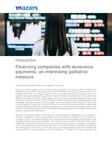
Financing companies with severance payments; an interesting palliative measure
Large and small companies are at the same juncture because of the effects of COVID-19; they want to keep their jobs and they want to stay alive, but their liquidity is not enough to pay more than 2 or 3 fortnights. After that, the company's cash flow will be seriously strained (and unreliable) due to the systemic failure generated by the pandemic. The Government announced that it will capitalize the National Guarantee Fund with 70 billion pesos, of which 20 billion would be destined to micro, small and medium-sized companies. The Vice President stated in the media that this would guarantee that companies could have access to working capital loans to be able to pay their payroll in these times of crisis. However, the good will of the Government is crushed by the banks, since their requirements for credit approval (sometimes as absurd as requiring an on-site visit to the company's facilities in the middle of a mandatory quarantine) are aimed at discouraging businessmen from taking out loans and having to resort to other alternatives.
While the Government takes a shock measure to guarantee the subsistence of the company in Colombia, a palliative measure was produced to solve the situation of illiquidity of the companies for a couple of months, thus preserving them as a unit producing work and welfare for the families, while navigating through these turbulent waters. This is Article 3 of Decree 488 of March 27, 2020, which states that "As long as the facts that gave rise to the Economic, Social and Ecological Emergency remain, the worker who has presented a decrease in his monthly income, certified by his employer, may withdraw each month from his severance account the amount that will allow him to compensate such reduction, in order to maintain his income constant (...)". Based on this rule, companies may agree (by mutual agreement and by means of an additional agreement to the labor contract) with higher income employees a voluntary (temporary) decrease in their salary remuneration, which will be compensated -month by month- with the withdrawal made from their severance pay fund, in such a way that their constant income is not affected. Once the crisis is overcome, or when the Government determines and implements the shock measure to save the Colombian company (interest free credits for the payment of payroll or subsidies for the payment of payroll), everything would return to normal, salaries would be reestablished and the company could make voluntary contributions to the workers' severance pay funds in order to reestablish the same to the value it had before making the "loan".
It should be remembered that the payment of severance payments (and interest on severance payments), which Colombian employers do with such rigor and discipline, is not part of the worker's remuneration, but is a mandatory saving for times of calamity, such as when the worker is laid off. Although the law allows withdrawing them for education or housing purposes, the philosophy of the contribution of severance payments is the protection of the unemployed and not the assumption of other expenses or investments (education and housing) which, although important, are not vital. It must be said that, in the case of payment of housing credits by individuals, banks have already suspended the collection of such credits for a term of 6 months.
This figure, which could be considered as a soft loan from higher income workers to the company, is an act of solidarity with those who have assumed the rigorous duty of complying with legal obligations such as timely payment of severance payments and interest thereon. It is an act of greatness in times of crisis where banks, concerned about their own utility and in an act of short-sightedness, have closed the doors to private enterprise. And, in addition to being an act of greatness, it is a strategic wisdom, since preserving the company is equivalent to preserving its own employment. To paraphrase John F. Kennedy, it could be said that there comes a time in business life when executives who have received benefits and stability from companies should ask themselves, not what the company should do for them, but what they can do for the company.


